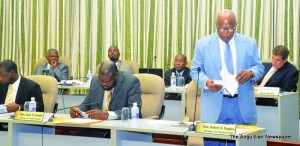
There continues to be much talk in Anguilla about the sitting of the House of Assembly on Friday, October 25. On that date, two Bills, originally listed for the first reading, were eventually given all three readings and passed as Acts of Parliament. The meeting was, however, held without a quorum because no one raised the matter and objected to the continued proceedings as required by the Anguilla Constitution.
The situation in the House has given rise to a letter from the three Opposition Members (who were not at the meeting) to Governor Christina Scott, requesting her not to assent to the legislation. That letter is published elsewhere in this edition of The Anguillian.

The matters before the House were the Money Services Business (Amendment) Bill, 2013; the Eastern Caribbean Central Bank (Agreement Bill), 2013; and the Fiscal Responsibility Bill, 2013. The first Bill was deferred for further discussion at the request of Chief Minister and Leader of Government Business, Hubert Hughes.
He explained that the Eastern Caribbean Central Bank (Amendment) Bill was to give effect to changes to the principal legislation agreed by the member territories of the Monetary Council. The changes, according to him, were “to better enable the ECCB to discharge its duties as established under law.” He added that “one of the common duties of the ECCB is to ensure the integrity and stability of the domestic banking system in member countries.”
The purpose of the Fiscal Responsibility Bill was to give effect to the British policy document, for the Overseas Territories, called the Framework for Fiscal Sustainability and Development which Mr Hughes signed in April this year after objecting to certain clauses. Both Bills were said to have had some urgency, particularly the latter which the British Government had been urging the Anguilla Government to enact in the House of Assembly by June this year.
The House commenced its proceedings with the Speaker, Mrs Barbara Webster-Bourne, apologising for the absence of the Elected Government Member, Walcott Richardson, who reported sick. Meanwhile, on the other side of the House, were the empty seats of the three Opposition Members – the Leader, Evans Rogers, Othlyn Vanterpool and Edison Baird.
Mr Rogers and Mr Vanterpool later complained to the media that they were only informed about the Friday House of Assembly meeting by word of mouth late Wednesday, while Mr Baird said he had not been contacted. Further, they stated that without having received the relevant documents for the meeting, they were at a disadvantage to prepare for the sitting of the House. Another complaint was that urgent meetings of the House were becoming too frequent when in fact there was a stipulated seven-day period of notification.
The absence of the four Elected Members left the House without a quorum. The situation was further worsened when the Second Nominated Member and Deputy Speaker, Roy Rogers, left the meeting and was later followed by the Attorney General, James Wood, and Acting Deputy Governor, Larry Franklin.
Mr Rogers subsequently spoke to the media about the situation, explaining that he had walked out of the meeting due to the lack of a quorum, and that the Speaker was aware of that deficiency in the membership of the House. “The Speaker has the responsibility to ensure that there is a quorum before she starts a meeting,” he stated. “Once a meeting is started and there is no quorum, somebody from the floor must get up and object. But the Speaker should make sure that there is a quorum before she starts a meeting, and she was quite aware that there was no quorum but she still started the meeting. Speakers are independent and make decisions on their own. I walked out because I couldn’t stay in there.
“If I stayed I would have had to get up and object so I preferred to walk out because there was a quorum issue before when I was Speaker… and then it was said that I brought Hubert’s Government down. So I am just not getting involved with it this time, and I preferred to walk out – but it is wrong for a meeting to begin without a quorum.”
The three Opposition Members, mentioned above, took up the matter when they hand-delivered a letter on Monday, October 28, to Governor Christina Scott, as mentioned earlier.
They wrote in part: “We strongly contend that were you to assent to these two bills you would undermine the principle of Good Governance and thereby set a dangerous precedent that could cause structural damage to the democratic foundation of our society. The Members of the Opposition were not properly informed and in one instance, not informed at all. In addition, the House was not properly constituted because there was no quorum as set out in the Constitution of Anguilla.”
The Opposition Members further stated that with their absence, and that of the Government Elected Member for West End, the two pieces of legislation were passed by only four Government Members in the House. They were Chief Minister Hughes, Ministers Evan Gumbs and Jerome Roberts and the unelected Parliamentary Secretary, Haydn Hughes.








